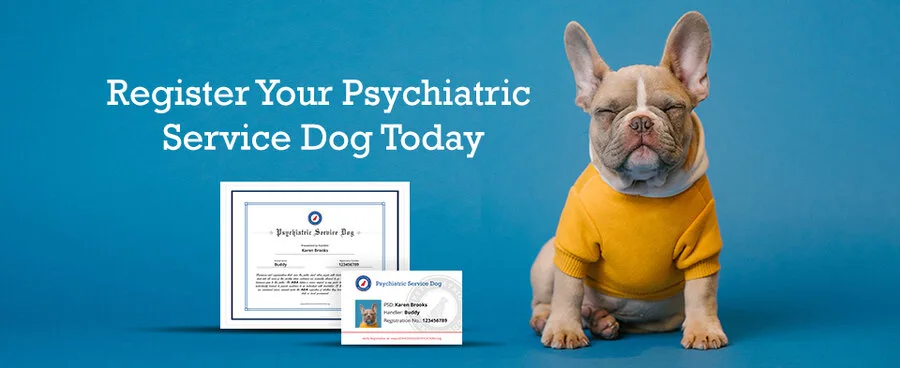Home Page › Blog › Housing Laws Protecting Service Dogs
Housing Laws Protecting Service Dogs

Service dog and psychiatric service dog owners have the right under the Americans with Disabilities Act to access public areas and venues that normally don’t allow pets. Service dogs can also board flights free of charge according to the U.S. Department of Transportation’s regulations.
But did you know federal and state housing laws also protect that service dogs? If you own a service dog, your animal must be allowed to live with you even if your building bans pets.
Under housing laws, service dogs are not considered “pets” and are exempt from most pet policies, such as rules that restrict the size and weight of animals in a building. Service dog owners also can’t be charged any fees or deposits by a housing provider.
We’ll explain these housing laws, how you qualify as a service dog owner, and what rights you have as a tenant.
What housing laws protect service dog owners?
The Fair Housing Act is a federal law that protects disabled tenants from discrimination. The U.S. Department of Housing (HUD) issues guidelines that instruct housing providers on accommodating tenants with service dogs or psychiatric service dogs.
The Fair Housing Act is applicable to every state in the United States. In addition, many states have enacted their housing laws that protect service dog owners, adding an additional layer of protection. These laws often mirror HUD’s protections. For example, California, New York, and Florida each have housing laws that recognize and protect service dog owners.
What type of housing is covered by Fair Housing rules for service dogs?
The Fair Housing Act applies to most types of housing, including rentals, condos, co-ops, and HOAs. However, there are exceptions: Certain landlords are exempt, such as owner-occupied buildings with no more than four units and single-family houses sold or rented by the owner without the use of an agent.
How do you qualify for a service dog?
There are two aspects to qualifying for a service dog:
- You must have a physical or mental health disability.
- Your own a service dog that is fully trained to assist with that disability.
Physical disabilities include blindness, deafness, and mobility limitations. Psychiatric disabilities include conditions like depression, anxiety, PTSD, bipolar disorder, learning disorders, phobias, or panic disorders that substantially limit a major life activity.
A licensed healthcare professional is best suited to evaluate whether you meet the criteria for having a psychiatric disability. If you qualify, you can get a PSD letter, a signed letter from a licensed health professional that sets out whether you meet the requirements for having a mental health disability.
The second criteria for owning a service dog are that your dog must be fully trained to perform a task that assists your disability. It must also be trained to behave properly in public settings. The service dog training can be done on your own or with the help of a professional trainer or organization.
Service dogs that help with physical disabilities perform tasks like pulling a wheelchair, guiding the visually impaired, alerting the owner of a rise or drop in blood sugar levels, providing stability while going up and down stairs or other hazardous areas, and retrieving items.
Psychiatric service dogs perform tasks like pawing or licking to calm their handlers during periods of distress, reminding them to take medication, interrupting panic attacks or “spells,” and interrupting repetitive or self-destructive behaviors.
Want to know if you qualify for a Psychiatric Service Dog?
Get the assessment from a licensed professional.
How can a landlord verify that you have a service dog?
Under HUD’s rules, your landlord can only verify if you have a service dog in a few specific ways.
If it is readily apparent that your dog is trained to perform tasks for the benefit of your disability, then your landlord is not allowed to ask any questions and must accept that your dog is a service animal. Examples of this include if the dog is guiding an individual with low vision, is pulling a wheelchair, or assists with stability to someone with an obvious mobility disability.
However, with psychiatric service dogs, it’s not always immediately apparent by visual inspection if the person is disabled and what the dog has been trained to do. In these circumstances, the housing provider can ONLY ask two questions:
- Is the animal required because of a disability?
- What work or task has the animal been trained to perform?
HUD guidelines are very clear that landlords cannot ask about the nature or extent of the tenant’s disability and cannot ask for any type of documentation. Tenants have a right to confidentiality regarding their medical details and history.
If you have a service dog or psychiatric service dog, it can be helpful to have service dog paraphernalia like ID cards, vests, and tags. They are especially helpful in buildings that restrict or ban pets since they signal to other tenants that your dog is a service dog. These items assist service dog handlers who want to avoid intrusive inquiries about why they have a dog on the premises.

What rights do service dog owners have in residential buildings?
Landlords must reasonably accommodate service dog and psychiatric service dog owners, even if the building bans all animals. They cannot restrict service dogs solely because they are a certain weight, size, or breed. Service dog owners are also exempt from paying any pet fees or deposits. As a tenant, you have the right to bring a service dog into your home before or after signing the lease.
These rights, however, are not absolute. There are circumstances where a landlord can deny the accommodation of a service dog. For example, if the service dog has exhibited dangerous behavior towards other people or has caused significant property damage, it may be grounds for rejecting a service dog. A service dog should never have these issues, as a fully trained service dog must be capable of behaving at all times and around other people and animals.
Do you need to register a service dog for housing?
Registering a service dog is an optional step for service dog owners. Landlords cannot insist on it as a prerequisite to granting accommodation. However, it is common for service dog owners to use items like ID cards, tags, vests, and harnesses to signal that their dog is a service animal. This can be especially useful if you live in a building that doesn’t allow dogs or has other pet restrictions. Having service dog accessories puts the other tenants and building staff on notice that you have a disability-related need for your canine.
About the Author: The writing team at Service Dog Certifications is made up of folks who really know their stuff when it comes to disability laws and assistance animals. Many of our writers and editors have service dogs themselves and share insights from their own experiences. All of us have a passion for disability rights and animals.
6 comments
Leave a Reply Cancel reply
Latest Posts

How to Bring a Service Dog to Disneyland
Trained service dogs are more than welcome to join their handlers at Disneyland. In this guide, we’ll explain Disneyland’s policies and give practical advice for bringing a service dog to Disneyland for the first time. Disneyland’s Service Dog Policies The Magic Kingdom is happy to welcome trained service dogs across most park locations! They kindly […]

Read More

Can Dogs Eat Tomatoes?
Yes! Dogs can safely enjoy tomatoes, but there are a few risks to be aware of so you can feed your dog responsibly. Fully ripe tomatoes (without the stems and leaves) can actually have nutrients that are good for your pup. Tomatoes have chlorogenic acid, an antioxidant that can have anti-inflammatory effects in cells. They’re […]

Read More

Can a Primary Care Doctor Write an ESA Letter?
Your family doctor, also called a primary care physician (PCP), can write a letter recommending an emotional support animal. We’ll explain what legally gives them that ability and explore what better options might be available for you. Why are Physicians Able to Write an ESA Letter? To turn your pet into an emotional support animal, […]

Read More







In the State of TN, are Landlords required to allow a service dog if it is Not a guided dog? For example, if the dog is for emotional reasons only, do Landlords in the State of TN have the right to refuse to rent to a tenant?
Under federal rules, service dogs can do much more than just be guide dogs. Psychiatric service dogs for example are another type of service dog. Please see this article for more details: https://www.servicedogcertifications.org/psychiatric-service-dog/
This is more of a questionable comment I supposed. First off, thank you so very much for your article and website. Your site is a valuable resource for anybody needing some basic questions answered, you certainly answered mine! Allow me to clarify, though. So, it is illegal for housing authorities, even hud housing, in california, to ask for proof other than those two questions and possible follow-ups listed? I am going through a situation, which, according to your site it should have been known by my project based housing rental that they have certain legal responsibilities regarding the inquiry of my legally obtained and registered service dog. I had told my worker at the Sacramento Housing and Redevelopment Authority about my service dog several times which supposedly she failed to tell my new landlord ( or maybe didn’t fail to based on the information provided here), however the landlords are requiring a signed note from my doctor including the indication that I do have a medically necessary disability and a prescription for the service dog. This is after my dog has already been registered with the Sacramento County authorities on service animals, even has service dog tags, but they are forcing me to see my doctor again to get a new letter/prescription and fill out a form that I feel is invading my privacy and medical rights.I hope that Mercy Housing knows what they are doing because I will file discrimination charges against them if, as I see here, this isn’t allowed. Shame Shame on them!
Thank you for the compliments! Under HUD rules you do not need a doctor’s note for a service dog. Best of luck!
I have registered my dog as a emotional support dog due to my daughters mental health. She has bipolar 2 depression and is in need of her dog to help her through difficult emotions however, I have been turned away many times with the claim that he is not a TRUE service dog. How can this be, we have a note from her Dr clearly stating that she meets the standard guidelines from the ADA as having a disability and is in need of her pet, this is how we registered him in the first place. I just don’t understand. A mental disability is just as prevalent as a physical disability! Do you have any guidance on what I can do to stop this from happening.
Emotional support dogs are not service dogs, but they are still protected under the Fair Housing Act for housing (not the ADA). You also do not need to register an ESA, you need a letter of recommendation from a doctor or therapist.